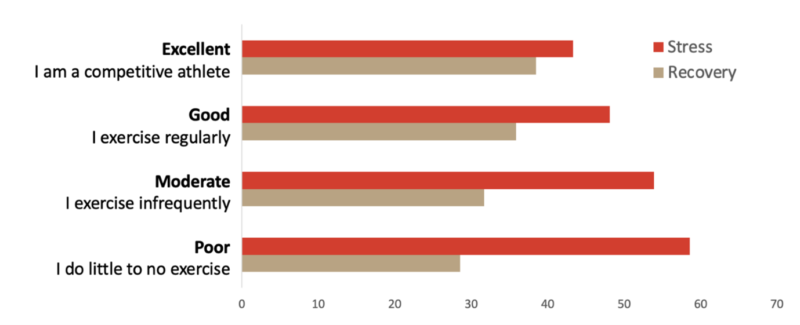
It’s a popular topic of discussion nowadays, but what does work-life balance really mean? Work-life balance is about how we use our time, resources, and energy between these two aspects of our lives. Is one aspect taking too much time away from the other? Are we coping well both at work and during our free time?
It is important to realize that a good work-life balance is not about striving for perfection. Days, weeks, and months differ from one another and can be subject to unexpected challenges or situations.
Instead of aiming for 100% all the time, here’s an idea: you don’t always need to give your best at work and at home. To quote Professor Svend Brinkmann:
“If you think positively every single day, work hard, strive to become the best version of yourself, surround yourself with inspirational people and never give up, then there are no limits to how exhausted you can become.’’
These words are an important reminder for all of us. Instead of striving for perfection at work and during our free time, we should attempt to find a healthy balance.
A Good Balance Gives You Energy – Despite Temporary Challenges
So, what is a good work-life balance? It’s all about being able to perform well at work, whilst also enjoying it or finding it meaningful. Work-related matters don’t usually follow you home or bother you at night. You can mentally disconnect yourself from your work.
Outside of work you still have sufficient energy for your hobbies and free time, and for spending time with your family and friends. You feel like you can truly be present in both aspects of your life.

Low physical activity level is associated with poor recovery. Firstbeat big data shows how individuals who exercise little have significantly more stress and less recovery than individuals who are physically active. Sufficient physical activity supports adequate recovery and stress management.
Of course, there are times which are more challenging, and things become off-balance. For example, a very stressful situation at work can easily influence your personal life. Or a challenging situation in your personal life, for example a breakup or ending an important relationship, can then negatively reflect on your work.
Short term imbalances are part of life and are naturally less harmful than a longer unstable situation. If we are in a situation for a long time where we feel like we do not have enough time and energy for both aspects of our lives, it will have negative consequences for our health and well-being. The constant guilt and feeling of not doing enough can also impact our mental health.
Life Isn’t Only About Living for the Weekends
We shouldn’t be living just for the weekends and holidays, dreaming of that free time, and operating in survival mode at work. Our free time should also not be merely about recovering from work. This type of situation is a sign of a major imbalance.
The ways to achieve work-life balance are highly individual and depend on your personal situation. The starting point and even the goals are not the same for all of us, and they can also vary during different points of our lives. For example, entrepreneurs often face different types of challenges than an average employee when it comes to work-life balance. Family and other care responsibilities also bring another piece into the puzzle.
The fast transition over the last few years to remote and hybrid work has also had its impact, either negative or positive. At its best remote work offers a chance to find a flexible and healthy balance between work and private life. But then, at its worst it can blur the lines between the two. Without clear routines for starting and ending a workday, such as commuting to work, the workday can become quite ineffective, or you can easily find yourself checking on work related matters after working hours.
How to Achieve a Better Balance?
There is no one recipe to success that would work for everyone. However, there are a few things you should try that can help you get closer to that healthy work-life balance and better well-being.
- Take good care of the foundation pillars of your well-being, such as healthy nutrition, good quality sleep and sufficient physical exercise. If you constantly notice that you are compromising on one of these – don’t. Start with a small change, like going to bed fifteen minutes earlier or starting your day with a short walk outside, even if you are working from home.
- Remember to also take care of your mental well-being, it is just as important as your physical well-being. Create new routines to support it, such as walking in nature, meeting up with friends, meditating or writing. Whatever works for you!
- Try to establish a healthy relationship with your work. Make sure to take sufficient breaks and build your workday to be more sustainable. Learn how to mentally and emotionally disconnect from your work. Do something you enjoy after you finish work. Try picking up your favourite book or grab your headphones and go for a run.
- Live according to your own values and listen to your intuition. Remember to be compassionate towards yourself, like you would be to a friend. Don’t be afraid to ask for help if you need it.
- Monitor your own well-being – we might need some help when it comes to managing our energy levels and well-being or understanding why we are not feeling well. Utilize professional support and objective measurement data to help you monitor and manage your well-being more effectively.

Firstbeat Life connects the dots between your body’s reactions and daily activities. It turns stress, recovery, sleep and exercise data into actionable insights.
With work-life balance, as in many other things, it is good to start with the basics and build a solid foundation first. By making even just a few small changes, you can achieve major improvements.
Balance stress and recovery for better health. With Firstbeat Life, you discover what’s right for you and how to improve your physical and mental well-being, one small change at a time. Learn more about Firstbeat Life.
You might also be interested in

Less Stressful Life Starts from the Inside: Harness Your Inner Voice to Support Stress Management
Traditionally, stress means a situation where the demands and challenges that we are faced with are so great that our resources are stretched to the limit – or insufficient. Quite…

Improve Your Fitness, Recover Better – Optimise Your Exercise with Firstbeat Life Training Effect
Physical activity and fitness level are associated with better recovery and stress management. Even a small increase in fitness improves your energy level and ability to recover. The Training Effect feature of Firstbeat Life wellness solution will help you optimize and balance your training better.

How to Help Your Employees Manage Stress – Tools for the Employer and HR
The word “stress” often has a negative meaning. However, the truth is that without stress we would find it very hard to cope with our day to day lives. Stress…


